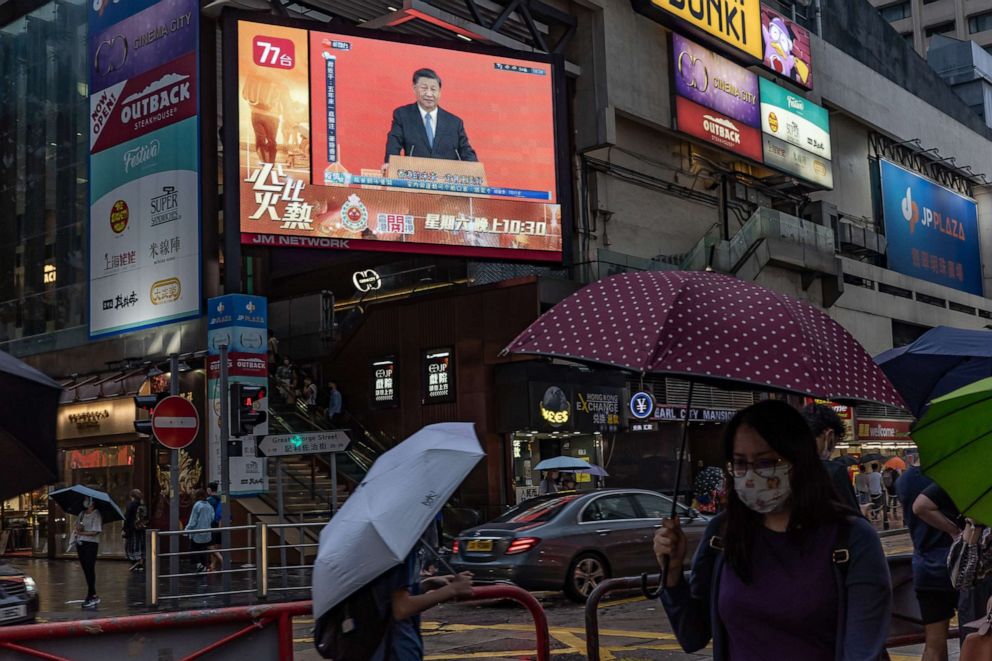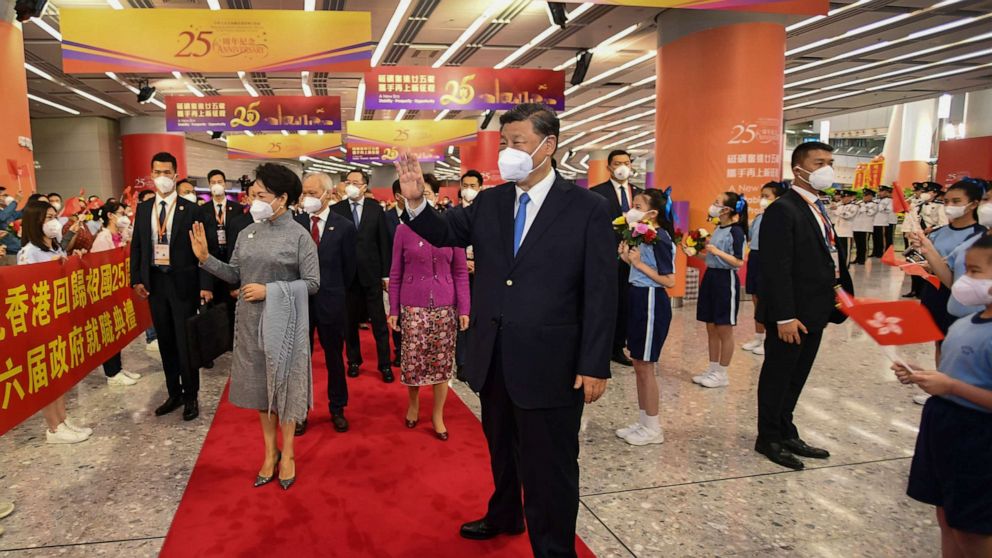HONG KONG — When Chinese President Xi Jinping stepped off a high speed train into Hong Kong on Thursday to throngs of flag waving residents and a traditional lion dance performance, it marked his first trip outside the borders of Mainland China in nearly 900 days, since the very beginning of the pandemic and also the first time the Chinese leader has set foot in the Chinese territory since the 2019 anti-government protests paralyzed the city.
“Hong Kong has withstood severe tests time and time again,” Xi said in brief remarks upon his arrival. “After ups and downs, Hong Kong has risen from the ashes and showed vigorous vitality.”
Amidst an incoming typhoon warning, a tight security blanket and a COVID-19 bubble, Xi returned to the city for a two-day visit to inaugurate the new Beijing-approved administration and celebrate the 25th anniversary of the former British colony’s return to China, marking the halfway point of the 50 year ‘One Country, Two Systems’ promise to Hong Kong that it could maintain its autonomy and capitalist system.
Everyone attending and interacting with Xi and his delegation over the next two days has had to isolate beforehand because COVID-19 infections in Hong Kong are much higher than on the zero-COVID-adhering mainland. Local media reports say Xi is not expected to overnight in Hong Kong, instead choosing to head back over the border before returning Friday morning. His total time in the city will only add a few hours over the two day span.
Nevertheless, Xi was bullish in his praise.
“One country, two systems has strong vitality,” Xi declared. “It can ensure Hong Kong’s long-term prosperity and stability.”
For many, the foundation of that “One Country, Two Systems” promise has crumbled since Xi was last in Hong Kong in 2017 for what was then the 20th anniversary of the handover.

HONG KONG, CHINA – JUNE 30: Chinese President Xi Jinping speaks during a news conference, displayed on a television screen at a shopping area on June 30, 2022 in Hong Kong, China. Hong Kong will celebrate the 25th anniversary of its handover from Britain to China on July 1.
Anthony Kwan/Getty Images
In a speech five years ago, Xi issued a terse warning that “any attempt to endanger China’s sovereignty and security, challenge the power of the central government” or to “use Hong Kong to carry out infiltration and sabotage against the mainland is an act that crosses the red line and is absolutely impermissible.”
Hours after that speech, tens of thousands of Hong Kong residents were still able to take to the streets that year for an annual pro-democracy protest march that coursed its way through the vibrant Asian financial center. Newsstands still sold pro-democracy papers and magazines and a boisterous contingent of opposition politicians locked heads with pro-Beijing counterparts.
Five years later Xi arrived in a very different city, one that has been silenced of outward dissent.
The at-times violent street protests that captured the world’s attention in 2019 had — in Xi’s view — crossed the “red line” he warned about.
Amid the pandemic, Beijing imposed a security crackdown that has not only quietened the streets but remade the fabric of the city. The National Security Law that was seeded into Hong Kong two years ago has either locked up, chased out or silenced nearly the entire once-vocal opposition.
Though its supporters deny it, speech has also been curtailed in the name of national security. Protest marches disappeared and all remembrances of the Tiananmen Square crackdown erased. Media outlets were either brought in line or forced to shutter like pro-democracy tycoon Jimmy Lai’s Apple Daily did last year. Lai, himself, now sits behind bars on multiple counts including national security charges that may keep him in prison for the rest of his life.
The electoral system for all officials and lawmakers was rewritten last year to ensure “only patriots governed Hong Kong,” tipping the scale in Beijing’s favor for the foreseeable future and closing the door on further democratic reforms. Hong Kong’s mini-constitution “The Basic Law” had aimed to work towards eventual universal suffrage but that is now on hold indefinitely.
School curriculums have been overhauled to ensure Beijing approved “patriotism” is instilled at a young age including new textbooks waiting in the wings that deny Hong Kong was ever a British Colony — apparently because, they argue, China never recognized British rule over their sovereign territory.

In this photo released by Xinhua News Agency, Chinese President Xi Jinping, center and his wife Peng Liyuan, center left, wave to welcoming crowd as they arrive to a train station in Hong Kong, Thursday, June 30, 2022. Xi has arrived in Hong Kong ahead of the 25th anniversary of the British handover and after a two-year transformation bringing the city more tightly under Communist Party control. It is Xi’s first trip outside of mainland China in nearly 2 ½ years.
Xie Huanchi/Xinhua via AP
On top of it all, Hong Kong’s strict COVID measures and sealed borders have cut off the city not only from mainland China but from the rest of the world, which has seen Hong Kong’s status as an aviation hub and international financial center squeezed away by local government policies as its economy contracted by 4% in the first quarter of this year — one of the worst performances in 30 years.
A combination of some or all these factors have contributed to Hong Kong residents voting with their feet. Since the beginning of the year there has been 154,000 net departures from the city, the highest rate since Hong Kong returned to China.
Chinese state media has played the developments differently with the People’s Daily declaring on Thursday, “the Hong Kong National Security Law has become the “patron saint” for safeguarding Hong Kong’s prosperity and stability.”
Hong Kong’s future is at a trepidatious crossroad and Beijing knows it. Earlier this month, the Hong Kong & Macau Affairs Office in Beijing which oversees the city took the unprecedented steps — despite the city’s supposed autonomy — to publish targets for the incoming administration led by John Lee, the former security official who implemented Beijing’s crackdown against the pro-democracy movement and press.
On the top of the list is affordable housing concerns, which Beijing blames for discontent in the city and “to improve Hong Kong’s international competitiveness.”
At the anniversary ceremony on Friday morning, Xi is expected again to give a speech outlining his vision for Hong Kong over the next five years. Unlike the speech he gave in 2017, he will no longer have to worry about issuing red lines because the government claims they’ve already dealt with those who he viewed to have violated them.
Xi, who is solidifying his case to be given an unprecedented third term as president later this year, will likely take a victory lap as the leader who finally brought this once rebellious city firmly back in the fold.

